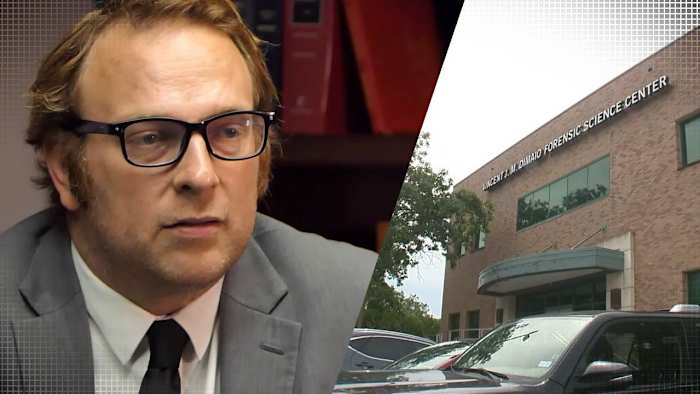SAN ANTONIO – A San Antonio man facing a lengthy prison sentence was instead able to get his felony drug case dismissed after his attorney called out the testing practices of the Bexar County Criminal Investigation Laboratory.
Prosecutors on May 19 dismissed the felony charge of drug possession with the intent to deliver – over 400 grams, citing insufficient evidence, court records show.
The dismissal came weeks after attorney Daniel Mehler filed a motion in the case requesting the court throw out testing evidence compiled by the lab.
“In Texas, for evidence to be admitted, it has to meet certain standards,” said Mehler, whose motion stated the county’s crime lab lacked the proper accreditation to quantitatively test case evidence: whether liquid in vape cartridges found on his client contained an illegal amount of THC.
A THC vape cartridge. (KSAT)
Quantitative testing determines concentration, pinning down the specific percentage of a drug in a substance.
Qualitative testing, which the lab is accredited to perform, relies on a visual inspection of a substance and whether it tests positive or negative for the presence of a drug.
The Bexar County Criminal Investigation Laboratory. (KSAT)
“They are accredited for that and that was sufficient prior to the legalization of hemp,” said Mehler, referring to the federal 2018 Farm Bill, which legalized growing cannabis with a concentration of less than .3% THC.
Texas lawmakers passed a measure a year later, aligning state law with the federal bill.
The case of Mehler’s client was dismissed prior to the motion being heard in court, records show.
“I was told when the state spoke with the analyst at the crime lab and said, ‘Look, can you tell us a number?’ She said, ‘No. I can’t do that. I’m not allowed to do that, and I won’t do that. I’m not going to jeopardize my career,’” Mehler said.
Defense attorney Daniel Mehler. (KSAT)
Reached for comment, a Bexar County District Attorney’s Office spokesperson wrote via email that the lab technician who tested the original sample moved out of state and was no longer able to testify. There was no sufficient sample left for retesting, the spokesperson said.
As Mehler pointed out, his client was accused of possessing over 400 grams of an illegal substance, which is roughly equivalent to a pound.
Mehler told KSAT that more defense attorneys should take a similar approach to pending drug cases.
“Do not plead these cases at all,” Mehler said. “The state simply cannot prove any of these substances are illegal.”
Potential impact of SB 3
Senate Bill 3, passed during the most recent Texas legislative session, would ban virtually all hemp-derived cannabinoid products statewide.
The bill, which was passed by both the Texas House and Senate, was sent to Gov. Greg Abbott to be signed into law late last month.
As of Tuesday, Abbott had yet to take action on the bill.
Mehler said if it is signed into law, prosecutors would no longer need to prove a certain concentration of THC exists in a substance.
This spring, Bexar County commissioners agreed to a $600,000 contract to have a North Texas lab, Armstrong Laboratories, assist with the county’s backlog of drug cases.
As Mehler pointed out, Armstrong is qualified to conduct quantitative drug testing.
When reached for comment, a Bexar County spokesman said the county’s crime lab is properly accredited and uses a qualitative over quantitative approach to THC testing.
“ANAB accreditation determines Marijuana/THC testing by qualitative (Positive/Negative) results over a quantitative (volume) approach. The crime lab utilizes 1% as its concentration threshold (3x the legal limit) to account for measurements of uncertainty associated with the analysis process,” Bexar County Assistant Public Information Officer Isaac Nero said via email.
Read more reporting on the KSAT Investigates page.
More recent KSAT Investigates coverage:
A San Antonio man facing a lengthy prison sentence was instead able to get his felony drug case dismissed after his attorney called out the testing practices of the Bexar County Criminal Investigation Laboratory. Read More


